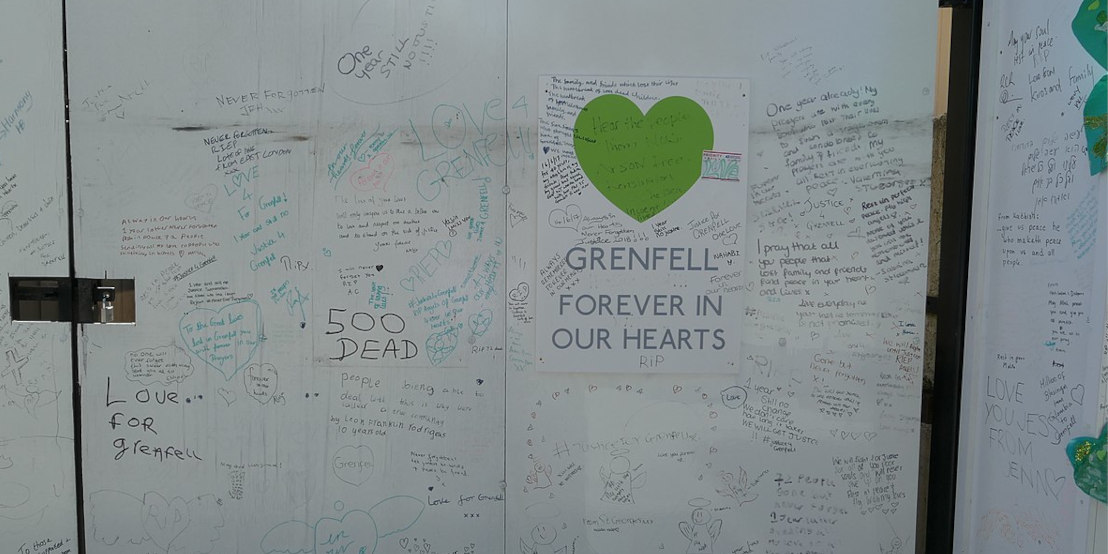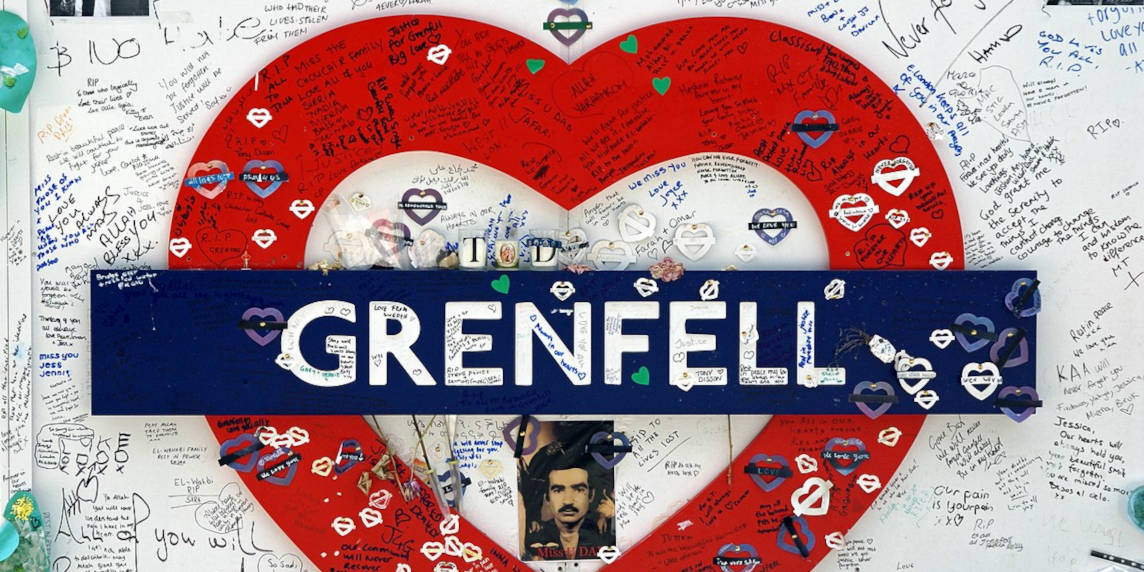14 June will be the sixth anniversary of the avoidable deaths of 72 people in the deadliest residential fire since the Blitz, for which there has still been no accountability, and no charges. Just the remains exist of the inferno, daily sickening all those who walk by with still vivid memories of that terrible night.
The ephemeral character of everyday journalism is inadequate for such a devastating event and the huge scale of system change that it requires. One journalist however, Richard Norton-Taylor, recognised the need for fresh attention. Norton-Taylor and theatre director Nick Kent turned verbatim scenes from the Grenfell Tower Inquiry (due to report later this year) into a powerful drama, ‘Grenfell: System Failure’, also published as a short book.
All the signs are that the report will be devastating. The problem is, as with reports before it (most notably the Coroner’s recommendations following the fatal fire at Lakanal House, a South London tower block in 2009), lack of enforcement. The play dramatises these issues through well chosen scenes from the inquiry’s interrogation of corporate and state witnesses, and revealing and moving stories from families of those who perished in the fire.
‘Each and every one of the deaths that occurred in Grenfell Tower on 14 June 2017 was avoidable,’ concluded the chief counsel to the inquiry.
Inflammable cladding
Tests on the materials used in the refurbishment of Grenfell Tower (Aluminium Composite Material (ACM) rainscreen panels, made of polyethylene (PE) plastic cores sandwiched between thin aluminium sheets) showed back in 2001 that these materials were highly inflammable. E-mails sent to the senior sales manager of Arconic (the company manufacturing these materials) stated that PE ‘burns like paper’ and that architects ‘when shown a live test, almost fainted’. The sales manager confirmed that Fire Retardant (FR) materials would have been more expensive and that Arconic did not withdraw the PE panel from the market for commercial reasons.
The 72 residents killed in the inferno would now be alive if local and national public officials responsible for fire safety had paid attention to previous residential fires in buildings clad in ACM, like the Dubai fires in 2012 and 2016; and had the government enforced the Lakanal Coroner’s recommendations of stronger, clearer fire prevention regulations in high rise buildings.
No public responsibility
The fact that the avoidable became the actuality reveals the human consequences of market-led politics. The chain of corporate cost-cutting with no public or ethical responsibility, the careless pen pushing or e-mail forwarding of civil service officials, and the ego and cowardice of ministers such as Eric Pickles, demonstrated a scary institutional habit of buck-passing. Influencing this process were Tory Prime Ministers’ instructions to reduce ‘unnecessary regulations’ under the Red Tape Challenge. ‘Regulation was a dirty word,’ said the former Head of Technical Policy at the Department of Communities and Local Government, explaining why he didn’t consider applying for an exemption for the Building Regulations from the Red Tape Challenge.
The leading lawyer, Richard Millett QC, used the metaphor of a ‘merry-go-round’ of buck-passing. But after interrogating participants from public or ex public bodies (like the recently privatised Building Research Establishment) he pointed to a deeper problem: he had hoped that his ‘task would be made easier by candid admissions of blame’.
The outpouring of support and grief for those killed in the fire was obvious from the hand written signs at the site
CREDIT: LOZ PYCOCK

Instead, he uncovered an absence of any sense of public responsibility, or social solidarity, within public and corporate institutions. ‘Expressions of regret for the victims of the fire have been as common, to the point of being trite, as admissions of responsibility have been rare,’ concluded Millett.
40 years of market driven politics has destroyed the institutions of formal accountability and the culture of public ethics through which these institutions could be genuinely responsive to social need – instead embedding a habitual acquiescence in the imperative to make profit.
Marx famously argued that consciousness is shaped by social being. The contrast between the self-serving lack of concern of senior public servants, and the depth of feelings of solidarity, mutuality and public duty shown by Grenfell residents and many of the firefighters trying to help them, couldn’t have been starker. The consciousness of these people too was shaped by social being – daily lives of mutual dependence in the case of the families of Grenfell and a vocation of saving lives in the case of the firefighters.
Neighbourly responsibility in action on the 23rd floor
Take Sabir Neda, his wife Shakila and son Farhad. They lived on the 23rd floor, flat 205. As smoke from the fire began to engulf the flats on that floor, women from two adjoining flats came to Sabir and Shakila’s flat for refuge. As the heat got worse and flames filled their kitchen, Shakila declared that she would jump out of the window, she didn’t want to be burnt alive. Her son pulled her back and with wet blankets over their heads, they agreed that they had no option but to leave the flat and descend the smoke and body filled stairs to safety. Sabir told his son and wife he’d be right behind them but he tried first to help and calm his neighbours. His son carried his disabled mother to safety. They never saw Sabir again. His brother-in-law, returning home elsewhere, heard a phone message from Sabir, calm and with no signs of fear: ‘Goodbye, I am leaving this world, goodbye. I hope you won’t be in pain.’
Families like Sabir’s want justice, accountability, charges, and system change
Sabir’s body was found by medics and firefighters and a post-mortem concluded that he died of ‘multiple injuries consistent with fall from height’. His son Farhad commented: ‘He could have come with us at that moment. However, he did not leave those women who were distressed and needed help in our flat.’
A continued fight
There are plans to turn the site of Grenfell Tower into a permanent memorial. The community is being consulted about what form a memorial should take: a place for children’s activities, or simply a space for the bereaved to get together. But families like Sabir’s want justice, accountability, charges, and system change.
Grenfell United, a group of local campaigners, are organising a powerful event to mark the anniversary and build pressure for enforcement of the tough recommendations likely to come from the inquiry report. Former MP Emma Dent Coad is working with local residents, socially committed architects and socialist MPs to develop a ‘Grenfell Charter’ of the necessary steps towards system change. ‘The scale of change is enormous, at many levels, local and national,’ says Dent Coad. Stronger regulations, a reversal of privatisation. And, above all, a truly public sector in line with the values of families like Sabir’s: responsibility for others, profound and practical solidarity and a refusal to let private vested interest prevail.
This requires a new kind of journalism to draw regular attention to the human culpability in such avoidable tragedies as Grenfell. Red Pepper will work with Richard Norton-Taylor and Emma Dent Coad over the coming months to give as loud a platform as it can to the efforts of survivors and their supporters to achieve the enforcement of the lessons learned through the inquiry. Only system change will ensure that such a tragedy never happens again.










